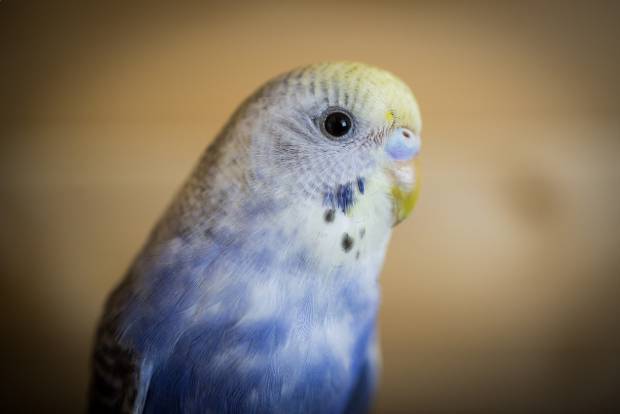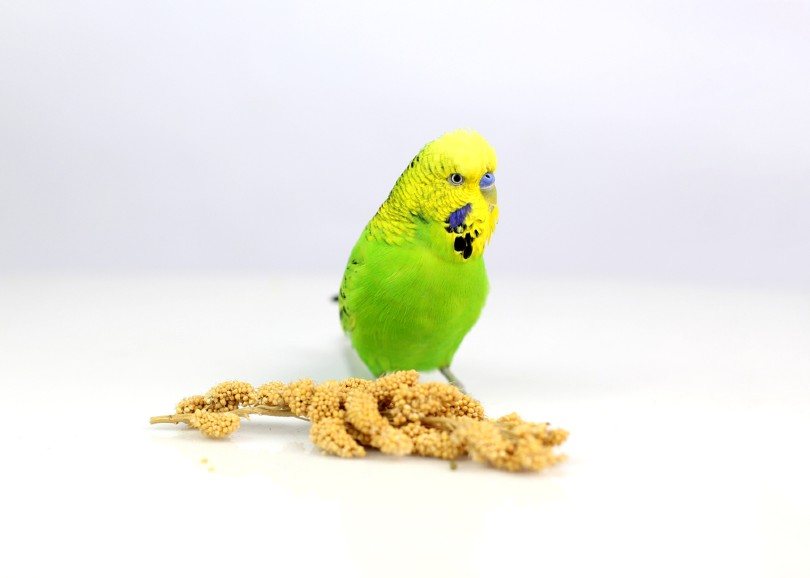
Imagine waking up every day to the blissful sound of cheerful chirping coming from right inside your home. Does the thought make you all warm and fuzzy inside? If so, we have great news because parakeets make wonderful pets. Keep reading to find out if owning a parakeet is the right choice for you.
 The 2 Things to Know Before You Bring Home a Parakeet
The 2 Things to Know Before You Bring Home a Parakeet
Keeping a tiny parakeet (or several parakeets!) comes with some environmental considerations.
1. Parakeets Need a Low-Stress Environment
For instance, they get stressed out easily. So, if you have a rambunctious household with other pets and small children, then a parakeet might not be the right addition to your family. However, if you still decide to bring a parakeet in, supervise your animals and make sure your birdcage locks are secure.
Meanwhile, parakeets can experience night frights. This is because they like to sleep at night and prefer the dark—but not a complete absence of light. With poor night vision, they’re easily startled and may injure themselves by thrashing around. This can be avoided by leaving a night light on or providing some other dull light source.
2. Parakeets Prefer a Moderate Climate and Good Air Quality
Parakeets survive best in temperatures between 60–70°F degrees, but they don’t tolerate extremes. At temps below 50°F, the bird will suffer; likewise, the same is true in heat above 85°F. Therefore, any sudden or drastic change in temperature could be harmful to these little birdies.
Other things to keep in mind around your home are the use of incense, diffusers, and scented candles. These respiratory irritants are harmful to tiny lungs. So, it goes without saying (we’re saying it anyway), parakeets need a smoke-free home.

Parakeet Lifespan
Provided a stress-free and warm home, free of pollutants, your parakeet can live up to 12 to 15 years. However, parakeets tend to hide their ailments far longer than is good for them, so it is essential to take your pet to an avian vet at least yearly. Some would even recommend bi-annual check-ups.
Parakeet Socialization
You’ve heard the term ‘social butterfly’. Many bird enthusiasts think the term should be, ‘social parakeets’! These birds are highly social and need at least an hour of your time every day. The question is whether parakeets should be kept in pairs, centered on the assumption that a solo bird tends to bond with its owner. On the other hand, if the owner isn’t available all the time, the bird may like some company.
If you’re frequently away from home for 8-24 hours, it would be better to have at least two parakeets. Don’t worry, though; it’s worth it. You will enjoy their interactions with each other, especially their antics. They can be pretty feisty at times and always chatty! They tend to chirp for most of the day, but they are not as loud as parrots and only squawk when irritated. Parakeets can learn simple words and can repeat some phrases but aren’t necessarily able to retain them for later use.
While interacting with your little friend(s), you can train them to climb on your finger and then to your shoulder. Letting them out of their cage is beneficial to their health. However, it can be messy. In the beginning, it is best to let them out for short periods. This will reduce the chances of your pet pooping all over the house. Once the birdie is acclimated to your home and its cage, it will be content hanging around its cage while it’s out. But expect your parakeet to take flight now and again.

Parakeet Habitat
Now that you have some background on parakeets, it’s time to prep for baby’s homecoming! First, let’s get you a cage. Your pet will be happiest with the roomiest cage you can find, so the rule of thumb is to get a giant enclosure that fits your budget and home. Bigger cages will hold all birdies’ favorite things, like their swing, toys, climbing ropes, chews, food and water dishes, and birdbath.
The location of the cage within your home is vital to your parakeet’s well-being. Try to have the cage in a warmer spot in your home and somewhere not easily knocked over.
Parakeet Diet
Besides a good birdseed mix, your parakeet will benefit from a healthy diet of fruits, vegetables, and legumes. Also, ensure that your parakeet has plenty of fresh water that is replaced daily. Of course, this goes for the birdbath, as well.
Before you purchase your new pet, find out if you have access to a nearby avian veterinarian. Just like any other pet, yours will be all the better with regular screenings.

Where to Buy or Adopt a Parakeet?
Your local pet shop is the first place to look for a parakeet; however, in today’s changing marketplace, you may be tempted to purchase a bird online. We recommend doing your research online, but we also suggest visiting an aviary or bird seller in person before making any decisions. Superstores like PetSmart have parakeets for sale and you can get them fairly cheap. A quick Google search will turn up a variety of aviaries and bird sellers near you. It’s not wise to purchase a bird sight unseen. People do it, of course, but we don’t endorse the practice.
 Happily Ever After
Happily Ever After
You now have the basics to bring home a fun-loving, cheerful parakeet. With some daily interactions, you will be well on your way to fostering a long and loving companionship between the two of you. We hope you will be waking to the sound of your parakeet’s chirping real soon. And we hope that chirping brings a smile to your face for years to come!
You might also be interested in:
Featured Image Credit: Jana Mackova, Shutterstock

 The 2 Things to Know Before You Bring Home a Parakeet
The 2 Things to Know Before You Bring Home a Parakeet





